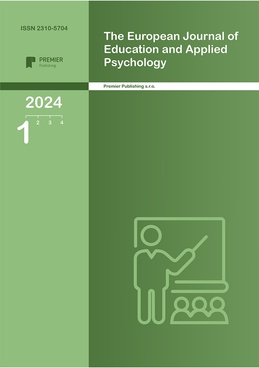COORDINATION SKILLS OF PUPILS IN LEARNING PHYSICAL EDUCATION
Authors
Arben Bozaxhiu, Edison Ikonomi, Joan Bozaxhiu

Share
Annotation
With coordination skills should recognize the level of physical motor skills and general and specific motor organs of the entity, capable to realize duty motor with less errors. Coordination skills appear and express the level of "motor coordination”. So motor coordination is the most essential features of coordination skills. The higher rates of occurrence of motor coordination, the higher level of coordination abilities of the higher levels of educational quality learning outcomes of sports performed during the learning process of sports teaching of the subjects. The purpose of this review paper is to analyze the literature and understand any movement or any physical activity that is correctly and harmoniously performed to achieve concrete actions of physical education. In order to fulfill this review are using methods of literature analysis, and is made combination and comparison of data from various works of authors varied. In the literature used, one can clearly see the importance of understanding that, the higher the level of pupils' coordination skills, the higher the level of acquisition of teaching tasks and the higher the level of motor skills education
Keywords
Authors
Arben Bozaxhiu, Edison Ikonomi, Joan Bozaxhiu

Share
References:
Adolph, K. E., & Franchak, J. M. (2017). The development of motor behaviour. Wiley Interdisciplinary Review of Cognitive Science, - 8(1), - P. 1430.https:/doi: 10.1002/wcs.1430
Armour, K. (2010). The physical education profession and its professional responsibility. Physical Education and Sport Pedagogy, - 15 (1), -P. 1–13.
http://dx.doi.org/10.1080/17408980903413479
Beni, S., Fletcher, T., & Chróinín, D. (2016). Meaningful experiences in physical education and youth sport: A review of the literature. Quest, - 69(3), - P. 291–312.
https://doi.org/10.1080/00336297.2016.1224192
Bernardi, J., & Andrews, R. (2009). Physical Education Self-Management for Healthy Active Lifestyles. International sport Science. Association Jeff Carpenter 2007, - P.17-18. https://www.amazon.com/Physical-Education-Self-Management-Healthy Lifestyles/d p/0736063 625
Brewer, C. (2015). Athletic Movement Skills. Human Kinetics. – P. 33-40.
Donath, F. (2012). Motor ability to children. Monography. H.T.P.E. – P. 58-113.
Fernandes, V. R., Ribeiro, M. L. S., Melo, T., De Tarso Maciel-Pinheiro, P., Guimarães, T. T., et al. (2016). Motor coordination correlates with academic achievement and cognitive function in children. Frontiers in Psychology, = (7), - P. 318.
https://doi.org/10.3389/fpsyg.2016.00318
Kasa, A. (2012). The basics of training with children aged 10-14, Tirana, 1996. (Ribotim). – P. 25-87.
Kemp, B.J., Cliff D.P., Chong, K.H., & Parrish. A.M. (2019). Longitudinal changes in domains of physical activity during childhood and adolescence: A systematic review. J. Sci Med. Sport. - 22(6), - P. 695-701. https://doi:10.1016/j.jsams.2018.12.012
Markola, L., Misja, B., Shore, N., & Markola, B. (2016). Movement education. ISBN 978-9928-206-12-1. - P. 43-47.
Mathisen, G.E. (2016). Effects of school-based intervention program on motor performance skills. Journal of Physical Education and Sport, - 16(3), - P. 737-742. https://doi: 10.7752/jpes.2016.03119
Mitchell, S. (2016). The Essential of Teaching Physical Education. Shape America - Society of Health and Physical Educators. ISBN 978-1-4925-0916-5. - P. 1-4.
Mc. Keuzie, T. L., & Kahan, D. (2008). Physical activity public health and elementary schools. The elementary school journal, 108 (3), 171-180. https://doi:10.1086/529100
Raiola, G. (2013). Body knowledge and motor skills. Knowledge Cultures, -1(6), -P. 64-72. https://www. net/publication/325454642_Body_knowledge_and_motor_skills
Zach, S., & Inglis, V. (2013). Physical education teachers and their attitudes toward change: Implementation of the New Horizon educational reform. Journal of Teaching in Physical Education, - (32), -P. 355-374. https:// doi:10.1123/jtpe.32.4.355


